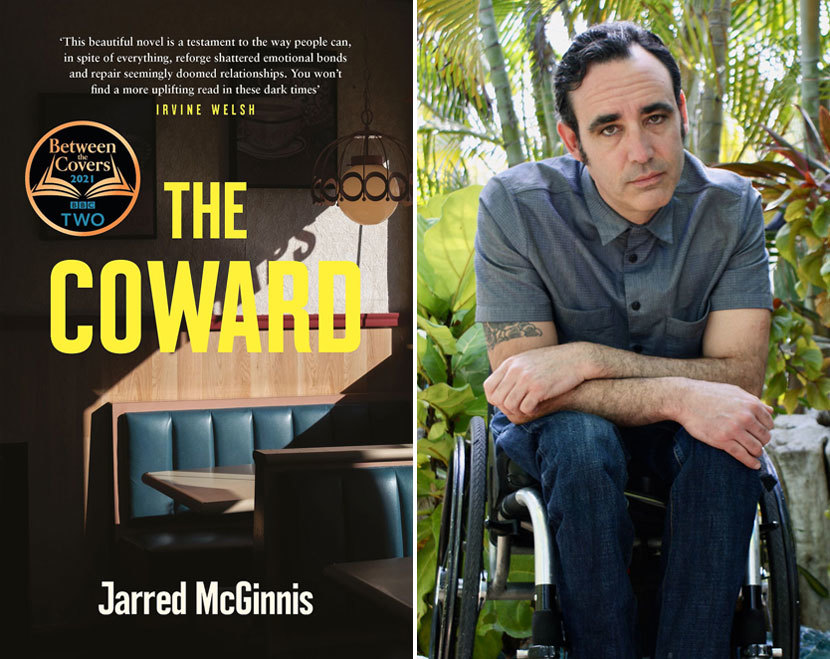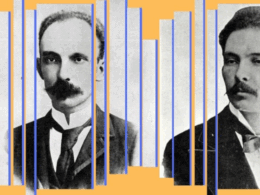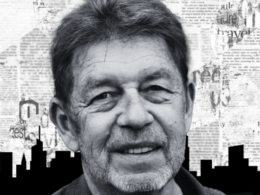
Our “Influences” series of guest posts by contemporary writers returns with the following contribution by Jarred McGinnis, whose autobiographical debut novel The Coward, published last year to rapturous acclaim in the United Kingdom, receives its American release this week from Canongate Books.
At the opening of The Coward, the narrator—also named Jarred—wakes up in a hospital emergency room to find that a horrific car crash has left him a paraplegic. His drastically altered circumstances mean that he has to move in with his estranged, alcoholic father; as the two of them attempt to reconcile Jarred also embarks on a tour through his manic, self-destructive past, reviewing the episodes that led up to his accident. Reviewers have singled out McGinnis’s ability to mine the story for black comedy amidst the pathos, with The Guardian hailing “a tender, wise, brutally funny novel that assiduously avoids the saccharine.”
By Jarred McGinnis
I wasn’t a writer until I emigrated to Europe. Reader, yes. But, author? With libraries full of masterworks, it seemed an absurd act of hubris, and it is, to think something I could write would be allowed to sit next to a book by someone like Cormac McCarthy. Now it does, thanks to Irish patronymic prefixes.
Physical and cultural separation from the United States made it easier for me to distinguish signal from noise, and my god, there is so much noise. It also enabled me to value the stories I had to tell. If I had stayed in Austin, I wouldn’t have been able to separate myself and what happened to me successfully enough to alchemize it into the fiction that is The Coward. Austin, Texas, needed to be a faraway land where my story happened once upon a time.
My two decades in Europe have been a huge influence on my prose and approach, but throughout, there is and was the immigrant’s longing for his native culture and language. To have your own language resonate in your head as only your mother tongue can. Below are some of the works and authors that influenced my work as an American learning his craft outside of America. Particularly American novelists who pushed the boundaries of the form.
Moby-Dick by Herman Melville goes first on this list and every list. I was at a conference in Crete. The place where I was staying, the only one wheelchair-accessible in the village, had one English book on its shelf, Melville’s masterpiece. My computer broke on the first day so I couldn’t work while at the conference. So, I sat on the beach and read Moby-Dick. Tough life, right? A book that I had avoided. As a Southerner I was generally exhausted by the predominance of Northern authors in the American canon. Today, Moby-Dick is a sacred text to me. I dip into it the way a Christian opens to a random page in the Psalms to find guidance and renew my faith in this curious religion of literature I have adopted. I became a Pan-American the day Melville cast his spell on me.
When an English friend found out I didn’t know Percival Everett, he ordered a copy of Erasure for me. He couldn’t know an American and not be able to talk about Everett’s work. At the time it was out of print in the UK—shame, shame! Erasure changed forever how I thought of what a novel could be. Everett implicates the reader by anticipating their prurient interest in race with his novel within a novel. My copy was the original Faber hardback edition, where the paper had different grades so you could physically see the “novel within a novel,” further fueling my extracurricular interests in the book as an artistic object. Everett above all others made me realize that what I thought were the boundaries of a novel were artificial. He started me on my path of wanting to push the existence of a written work beyond the endpapers.
The main character of The Coward is a young man named Jarred McGinnis who, like the author, was in a life-changing car accident. It’s a novel but I read memoirs to see what techniques I could steal. I read The Duke of Deception by Geoffrey Wolff and This Boy’s Life by Tobias Wolff. Both are accomplished memoirs in and of themselves but the most interesting thing to me is to read them together, as they are two different perspectives on the same family at the same time. The Coward was always going to be the first of two books. As I am sitting down to write that second book, I’m thinking about how to create resonances similar to what I found in the Wolff brothers’ memoirs. To have two books that are independent of each other but create a unique and synergetic experience if both are read. That’s the plan, anyway.
Born and raised in Florida, Jarred McGinnis went to college in Scotland, lived in the UK for most of his adult life, and currently resides in the south of France. In 2018 his short fiction was included in the Simon & Schuster UK anthology A Short Affair, and prior to that he was the creative director for “Moby-Dick Unabridged,” a four-day immersive multimedia reading of Melville’s novel at London’s Southbank Centre that involved hundreds of participants. McGinnis’s author bio concludes: “He also has a PhD in Artificial Intelligence, but mostly he inspires the able-bodied by driving a car all by himself and taking his daughters to the playground.”



